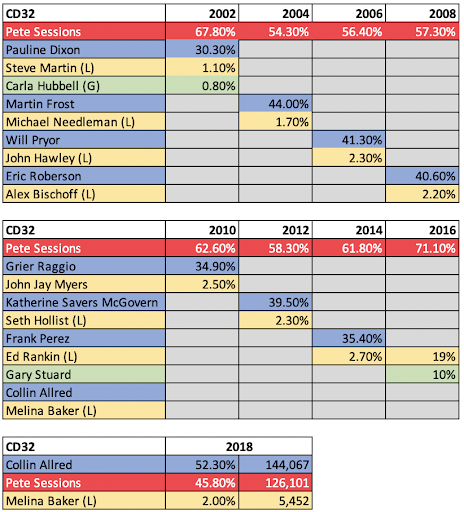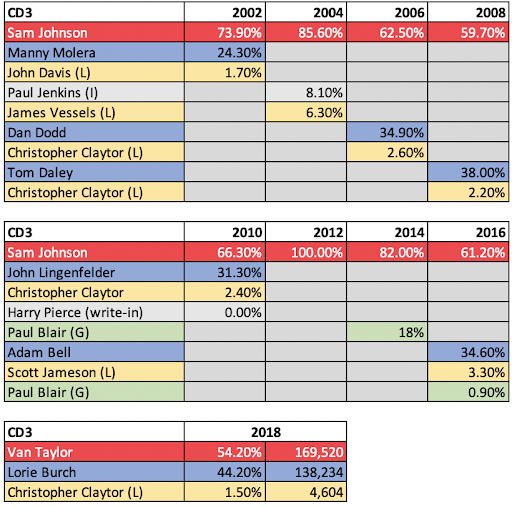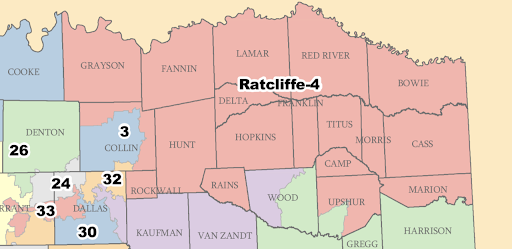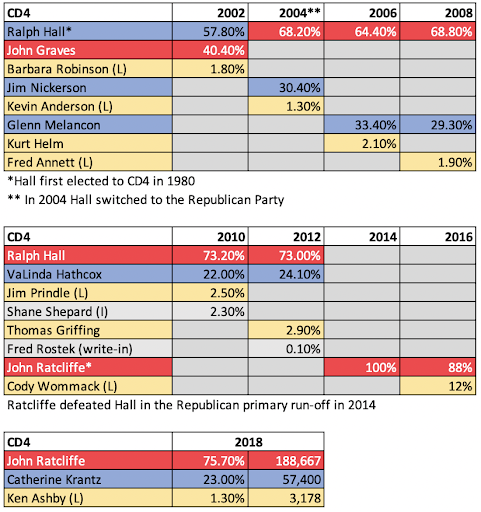Red to Blue: Can a Congressional Seat Be Flipped?
Collin County, like Texas overall, has been slowly turning from reliably Republican red to Purple and is on the verge of turning Democratic blue. But can Collin Democrats flip another of the three Congressional seats in the county?
This essay is the second of a series looking at 2020 Collin County races, and is focused on Collin County US Congressional races. The final paper will review Collin County judicial races.
Collin County includes all or parts of three US Congressional Districts:
CD3 (fully-contained within Collin County) includes all of the cities of the suburban southwest quadrant of the county: Plano, Allen, McKinney, Frisco, Prosper, the Collin County parts of Dallas, Garland, and Richardson, plus the smaller towns of Fairview, Lucas, Parker, Murphy, Princeton, and Melissa, up into the central and northeast corner of the county.
[mepr-hide] https://pagead2.googlesyndication.com/pagead/js/adsbygoogle.js (adsbygoogle = window.adsbygoogle || []).push({}); [/mepr-hide]
CD4 is very large size-wise, and includes the mostly rural northern and eastern edges of the county, including the fast-growing city of Celina, along with 16 counties in the northeast corner of Texas, plus part of a 17th.
CD32.
Finally, CD32, which is mostly in Dallas County, covers a small part of southern Collin County including parts of Sachse, Wylie, and Garland. CD32 is critically important because Collin Democrats, along with their Dallas County colleagues, in 2018 upset the eight-term incumbent Pete Sessions and elected Colin Allred to Congress. Allred, a Dallas County native who played football for Baylor University and the NFL Tennessee Titans, is a civil rights lawyer who worked for Julian Castro in the Obama Administration’s Dept. of Housing and Urban Development.
CD32 was considered to be flippable in 2018 despite Sessions’ long incumbency given the district, after voting for the Republican presidential nominee since Bush in 2004, went for Clinton in 2016 by 2 points.
What is interesting is that the election year that the Democratic nominee for President, Hillary Clinton, gained more votes than Donald Trump, Democrats didn’t even field a candidate for CD32, and Sessions won with over 71% of the vote.
But 2018 was different; voters were appalled after two years of Trump’s erratic Administration and generally unpopular policies, in particular, his focus on repealing the Affordable Care Act. In fact, health care was a major focus not just in CD32 but across the electorate in 2018, and Sessions was frequently berated for supporting Trump’s efforts to repeal the ACA. The Senate campaign of Beto O’Rourke also had a positive effect on Allred’s campaign, by energizing voters statewide and bringing attention to other candidates on the ballot.
[mepr-hide] https://pagead2.googlesyndication.com/pagead/js/adsbygoogle.js (adsbygoogle = window.adsbygoogle || []).push({}); [/mepr-hide]But Allred also ran a well-tuned campaign that walked a line between appealing to district Democrats and also brought in independents and Republicans who were turned off by Trump’s behavior and unpopular policies. He ran a large grass-roots campaign that got out the vote, he was able to leverage outside money in addition to local fundraising, and in the end overwhelmed Sessions’ campaign. Allred raised $5.97M ($4.93M from people) in 2018 to Sessions’ $5.1M (just $2.8M from people — the rest from right-wing or Republican PACs).
For 2020, Allred did not face a primary challenge. The Republicans fielded five candidates in their primary; political newcomer
Genevieve Collins won the primary outright with 52.6% of the nearly 42,000 votes cast. Allred is widely expected to hold onto his seat; in Q1/2020 fundraising, Allred reported donations more than double Collins’, $2.9M to $1.4M. To learn about Colin Allred, to volunteer for his campaign, or to donate, see https://www.colinallred.com/.
CD3:
If Democrats are going to flip a seat in Collin County, CD3 is the one. Currently held by first-term Republican Van Taylor, he is the first new Congressman for CD3 after the 13-plus terms served by former Congressman Sam Johnson, who was first elected to the seat in 1991. The district has been held by a Republican since 1968.
[mepr-hide] https://pagead2.googlesyndication.com/pagead/js/adsbygoogle.js (adsbygoogle = window.adsbygoogle || []).push({}); [/mepr-hide]
Since 2002, as can be seen in the election history graphic above, Democrats failed to even run a candidate in several cycles, and one year, 2012, Johnson didn’t even have an opponent in the General. Of note, the Democratic candidate in 2006, the late Dan Dodd, was CCDP Chair from 2008–2010. In 2014, only a Green Party candidate opposed Johnson.
In 2016, Democrat Adam Bell did reasonably well, doing better than any opposition candidate since 2006, but still fell well short of unseating Johnson, who announced he’d be retiring after the 2016 term.
Adam Bell ran again in the Democratic primary in 2018, but came in third behind newcomers Lorie Burch and Sam Johnson (unrelated to the then-incumbent Sam Johnson) in a four-way primary that also included fourth-place finisher Medrick Yhap. Lorie Burch prevailed in the primary run-off. Van Taylor, at the time the incumbent for State Senate District 8, easily won a three-way Republican primary with 84.7% of the 53,712 votes cast.
In the 2018 General, Lorie ran a strong campaign but could not match Taylor’s fundraising — she only managed to raise $313k, compared to Taylor’s $3.78M. Still, she performed better than any other non-Republican candidate in 28+ years, both in percentage and total votes, and showed that Democratic candidates can be competitive in CD3.
For 2020, Taylor did not face a primary challenger, though Roger Barone announced but dropped out prior to the primary. He ran for this seat in 2016 as an Independent but did not get onto the ballot.
In the Democratic Primary, a three-way race between Tanner Do, Sean McCaffity, and Helane “Lulu” Seikaly resulted in a run-off between Lulu and Sean; Lulu finished 514 votes ahead of Sean out of 63,000 votes cast. The run-off has been postponed to July 14th due to the pandemic emergency. Sean has a slight fundraising edge over Lulu, having raised $385,857 compared to her $251,187; but the ultimate nominee will have to contend with Taylor’s fundraising, which is $1,388,215 so far.
[mepr-hide] https://pagead2.googlesyndication.com/pagead/js/adsbygoogle.js (adsbygoogle = window.adsbygoogle || []).push({}); [/mepr-hide]Lulu Seikaly prevailed in the runoff between her and McCaffity, and will face Taylor in November.
Can CD3 be flipped?
Despite her solid performance in 2018, Lorie Burch still finished 10 points behind Taylor while running for the open seat left by Sam Johnson’s retirement. Now that Taylor is running as an incumbent, it will be more difficult to dislodge him. Still, CD3 continues to change; from 2016 to 2020, the number of registered voters in Collin County increased by 103,916, a nearly 21% increase, while overall population grew by only about 5%. And 44,316 more voters cast a ballot in the 2020 Democratic primary than in the Republican primary in the county.
Some of that can be attributed to less Republican excitement for the primary since the presidential nominee was effectively set, but the changes in numbers do seem to favor Democratic candidates. Another factor in favor of flipping: CD3 is the most highly educated populace that is still represented by a Republican.To find out more about our candidates, to volunteer, or to donate, see Lulu Seikaly’s campaign page at https://lulufortexas.com.
CD4:
This district, once held by former House Speaker Sam Rayburn (who our SH121 Tollway is named after) and Ray Roberts, who our reservoir is named after, will be the toughest to flip back to Democratic. I say back, because it was held by Democrats from 1871 to 2004, when then Democratic incumbent Ralph Hall switched parties from Democratic to Republican; Hall was the last Democrat to hold office in Collin County until Colin Allred was elected to Congress in 2018.

The district has been in Republican hands ever since. It is currently held by John Ratcliffe, a reliable lapdog for Trump who has voted in line with Trump over 92% of the time during his time in Congress, and over 95% of the time in the current Congress (according to FiveThirtyEight). Ratcliffe was one of the Republican Congressmen selected to be part of Trump’s defense team during his impeachment trial in the Senate. About this, Ratcliffe stated, “I took an oath to defend the Constitution. This impeachment is an assault on due process.
It’s an assault on the separation of powers. It’s unconstitutional. I’m grateful for the opportunity to make that clear to every American during the Senate trial.” He then went and worked with the White House on the defense, showing how much he really believes in “separation of powers.”

Unfortunately, even 2018 was not a good cycle for Democrats.
Our candidate, Catherine Krantz, did slightly worse than the last Democrat to run in that seat, VaLinda Hathcox, in 2012 (Democrats didn’t even field a candidate in 2014 or 2016). All of the counties in CD4 are very solid red, with Cruz taking percentages over Beto in 2018 of high 70% to even low 80% of the vote. Rockwall Co was the lowest percentage for Cruz with 68.8%; in Wood Co Cruz scored nearly 84% of the vote. Gaining ground in CD4 is going to be a difficult challenge for Democrats.
In 2019, John Ratcliffe was nominated by Trump to be the new Director of National Intelligence (DNI) to replace Dan Coats despite his lack of experience or even apparent interest in national intelligence or defense issues.
When press reports began to circulate about how Ratcliffe had misrepresented his role in prosecuting terrorism and immigration cases while a US Attorney in the Eastern District of Texas, Senate Democrats and even Republicans expressed a lack of confidence that resulted in Trump withdrawing his nomination.
On February 28, 2020, Trump again nominated Ratcliffe, but that could be a stalling tactic to “reset the clock” on the Acting DNI, Ric Grenell, who is also the current Ambassador to Germany. Grenell, whose main qualifications seem to be that he’s strongly defended Trump on Fox News, has even less chance to be confirmed in the Senate than Ratcliffe, but in nominating Ratcliffe, the time that Grenell can be “acting” DNI is increased to whenever the Senate confirms Ratcliffe, or for six months after the nomination is rejected.
[mepr-hide] https://pagead2.googlesyndication.com/pagead/js/adsbygoogle.js (adsbygoogle = window.adsbygoogle || []).push({}); [/mepr-hide]For 2020, Democratic candidate Russell Foster did not face a primary opponent; neither did Ratcliffe for the Republican primary. Libertarian Lou Antonelli also declared his candidacy for 2020. Foster is from Sherman, and works in Information Technology for a hospital in Texoma. His policy focus is on healthcare for all, supporting public education, and ensuring equal rights for all. To learn more about Russell, to volunteer, or to donate, see https://foster4texas.com/.
Update: John Ratcliffe was confirmed as Director of National Intelligence on May 21, 2020. County and precinct chairs in CD4 are scheduled to meet August 8 to choose a replacement nominee. Several Republicans have declared they are seeking to replace Ratcliffe for the remainder of the current term, including State Senator Pat Fallon of Prosper.
Beyond 2020
With redistricting coming following the Federal Census this year, Texas could gain 3 or 4 Congressional seats. It is likely that one of those new seats could land in Collin County, which has been one of the fastest growing counties not just in Texas but in the US overall. The pandemic emergency is making everything about the 2020 elections uncertain, from how to campaign in a time of “social distancing” to how voting will actually happen, and will even impact the Census, if social distancing prevents in-person counting. If Trump’s late and incompetent response to the pandemic, the resultant collapsing economy, and his farcical daily briefings start to sour moderate Republicans and independents on Republican candidates overall, Democrats could flip the US Senate, and we here in Texas could very well flip the State House. With redistricting, taking control of the State House will be critical to ensure the redrawn districts, and any added seats, are not gerrymandered to advantage Republicans.
[mepr-hide] https://pagead2.googlesyndication.com/pagead/js/adsbygoogle.js (adsbygoogle = window.adsbygoogle || []).push({}); [/mepr-hide]Notes:
Thank you to John Stafford for fact-checking and proof-reading my drafts.
More Democratic ballots cast during 2020 primary compared to 2016 in Dallas-Fort Worth
My Congressional District — US Census

Jeff Quiggle
Vice President of Plano Area Democrats Club
Aside from being the Vice President of Plano Area Democratic Club, Jeff is also Collin County Democratic Precinct Chair, and a member of Texas Democratic Veterans. He lives in Plano.

